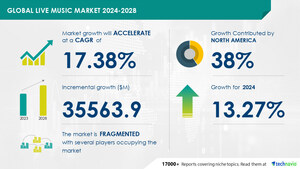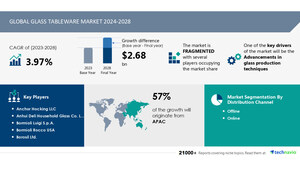NEW YORK, June 25, 2024 /PRNewswire/ -- The global glycolic acid market size is estimated to grow by USD 186.6 million from 2024-2028, according to Technavio. The market is estimated to grow at a CAGR of almost 8.77% during the forecast period. Growing demand from cosmetics industry is driving market growth, with a trend towards development of new applications to manufacture shampoo for companion animals using glycolic acid. However, availability of inexpensive alternative products poses a challenge. Key market players include Acuro Organics Ltd., Avid Organics, CABB Group GmbH, China Petrochemical Corp., CrossChem Ltd., DuPont de Nemours Inc., Glentham Life Sciences Ltd., Hefei TNJ Chemical Industry Co. Ltd., Jiaxing Jlight Chemicals Co. Ltd., Kumar Industries, Kureha Corp., Mehul Dye Chem Industries, Merck KGaA, Phibro Animal Health Corp., RXChemicals, Saanvi Corp., Shandong Xinhua Pharmaceutical I and E Co. Ltd., The Chemours Co., Water Chemical Co. Ltd., and Zhonglan Industry Co. Ltd..
Get a detailed analysis on regions, market segments, customer landscape, and companies- View the snapshot of this report
Glycolic Acid Market Scope |
|
Report Coverage |
Details |
Base year |
2023 |
Historic period |
2018 - 2022 |
Forecast period |
2024-2028 |
Growth momentum & CAGR |
Accelerate at a CAGR of 8.77% |
Market growth 2024-2028 |
USD 186.6 million |
Market structure |
Fragmented |
YoY growth 2022-2023 (%) |
7.87 |
Regional analysis |
APAC, North America, Europe, South America, and Middle East and Africa |
Performing market contribution |
APAC at 38% |
Key countries |
China, US, Germany, Canada, and UK |
Key companies profiled |
Acuro Organics Ltd., Avid Organics, CABB Group GmbH, China Petrochemical Corp., CrossChem Ltd., DuPont de Nemours Inc., Glentham Life Sciences Ltd., Hefei TNJ Chemical Industry Co. Ltd., Jiaxing Jlight Chemicals Co. Ltd., Kumar Industries, Kureha Corp., Mehul Dye Chem Industries, Merck KGaA, Phibro Animal Health Corp., RXChemicals, Saanvi Corp., Shandong Xinhua Pharmaceutical I and E Co. Ltd., The Chemours Co., Water Chemical Co. Ltd., and Zhonglan Industry Co. Ltd. |
Market Driver
The global pet grooming market is experiencing notable growth, projected to expand at a CAGR of over 4%. Factors fueling this trend include an expanding animal population, increased pet adoption, rising pet health expenditures, and a preference for premium pet products. One emerging application in this sector is the use of glycolic acid in companion animal shampoos. This ingredient benefits dry and damaged skin, restores skin barriers, reduces scales and crusts, and alleviates itching and irritation. Despite challenges, glycolic acid veterinary shampoos represent a significant market opportunity, contributing to the growth of the glycolic acid market during the forecast period.
The glycolic acid market is experiencing significant growth, with numerous companies producing and distributing this essential ingredient. This alpha-hydroxy acid is commonly used in cosmetics and skincare products due to its exfoliating properties. The use of glycolic acid in anti-aging and skin lightening treatments is on the rise. Additionally, its effectiveness in improving the overall texture and tone of the skin is driving demand. The cost-effective nature of glycolic acid production and its wide range of applications make it a popular choice in the beauty industry. Furthermore, research and development efforts are focused on enhancing the efficacy and safety of glycolic acid products. Overall, the glycolic acid market is expected to continue its upward trend in the coming years.
Research report provides comprehensive data on impact of trend. For more details- Download a Sample Report
Market Challenges
- The cosmetics industry's shift towards cost-effective alternatives to glycolic acid, such as salicylic acid and lactic acid, is expected to negatively impact the glycolic acid market growth. Salicylic acid, a keratolytic agent, effectively removes dead skin cells and treats acne, oily skin, and inflammatory hyperpigmentation. Lactic acid, a humectant, attracts moisture and is less irritating, making it a preferred choice in higher concentrations for its cost-effectiveness. These alternatives offer similar benefits to glycolic acid but with superior properties and lower costs.
- The Glycolic Acid market faces several challenges in its production and application. The primary challenge is the high cost of production due to the complex process involved. Another challenge is the inconsistent supply of raw materials, particularly corncobs and sugarcane, which are key sources of glycolic acid. Renewable sources like fruit waste are being explored as alternatives. Regulations regarding the use of glycolic acid in cosmetics and food industries also pose challenges. Producers must adhere to strict guidelines to ensure safety and quality. Additionally, the increasing demand for organic and natural products calls for the development of sustainable and eco-friendly production methods.
For more insights on driver and challenges - Request a sample report!
Segment Overview
This glycolic acid market report extensively covers market segmentation by
- Grade Type
- 1.1 Cosmetic grade
- 1.2 Technical grade
- Application
- 2.1 Personal care and cosmetics
- 2.2 Household cleaners
- 2.3 Industrial
- 2.4 Others
- Geography
- 3.1 APAC
- 3.2 North America
- 3.3 Europe
- 3.4 South America
- 3.5 Middle East and Africa
1.1 Cosmetic grade- The cosmetic-grade segment of glycolic acid is expected to grow significantly due to the increasing use of personal care and cosmetic products. Its tiny molecular structure enhances the performance of keratin-based products, making it ideal for skincare. Valued at $195 million in 2018, this segment is driven by demand from people seeking to maintain a youthful appearance and prevent aging signs like wrinkles and dark spots. Various vendors offer cosmetic-grade glycolic acid, contributing to this growth trend.
For more information on market segmentation with geographical analysis including forecast (2024-2028) and historic data (2017-2021) - Download a Sample Report
Research Analysis
In the context of rapid urbanization and emerging economies, the issue of greenhouse gas emissions has become increasingly significant. The manufacturing sector, including chemical and petrochemical industries, contributes substantially to carbon footprint due to energy-intensive processes and the use of fossil fuels. However, there is a growing demand for cost-effective solutions to enhance energy efficiency and reduce emissions. One such solution is the implementation of energy-efficient buildings, which can significantly decrease the carbon footprint of industries. Renewable power generation, such as solar, wind, and hydroelectric power, is another promising approach. In this regard, advanced technologies like Tube inserts for Shell and Plate frame products, Air-cooled products, and materials like metals and alloys, are being utilized to improve the energy efficiency of HVAC systems. Moreover, the transition towards renewable energy sources and the reduction of fluorinated gases in manufacturing processes are essential steps towards mitigating greenhouse gas emissions. The use of steel, aluminum, and copper in the production of chemicals and petrochemicals can also be optimized to minimize energy consumption and carbon emissions. Glycolic Acid, a popular chemical used in various industries, is also subject to these trends. Its production and application can be made more sustainable by adopting energy-efficient manufacturing technologies and utilizing renewable energy sources.
Market Research Overview
The glycolic acid market refers to the global trade of glycolic acid and its derivatives. This organic compound, with the molecular formula CH2(OH)2COOH, is a naturally occurring alpha-hydroxy acid found in various fruits and sugars. Glycolic acid is widely used in the cosmetics industry for skin peeling and exfoliation due to its ability to penetrate deep into the skin and remove dead cells. Additionally, it is employed in various industrial applications, such as in the production of polymers and resins. The market for glycolic acid is driven by its wide range of applications and increasing demand for skincare products. The production of glycolic acid involves fermentation of corn or other raw materials, followed by purification and concentration processes. The market for glycolic acid is expected to grow significantly in the coming years due to its increasing use in various industries and the rising demand for skincare products.
Table of Contents:
1 Executive Summary
2 Market Landscape
3 Market Sizing
4 Historic Market Size
5 Five Forces Analysis
6 Market Segmentation
- Grade Type
- Cosmetic Grade
- Technical Grade
- Application
- Personal Care And Cosmetics
- Household Cleaners
- Industrial
- Others
- Geography
- APAC
- North America
- Europe
- South America
- Middle East And Africa
7 Customer Landscape
8 Geographic Landscape
9 Drivers, Challenges, and Trends
10 Company Landscape
11 Company Analysis
12 Appendix
About Technavio
Technavio is a leading global technology research and advisory company. Their research and analysis focuses on emerging market trends and provides actionable insights to help businesses identify market opportunities and develop effective strategies to optimize their market positions.
With over 500 specialized analysts, Technavio's report library consists of more than 17,000 reports and counting, covering 800 technologies, spanning across 50 countries. Their client base consists of enterprises of all sizes, including more than 100 Fortune 500 companies. This growing client base relies on Technavio's comprehensive coverage, extensive research, and actionable market insights to identify opportunities in existing and potential markets and assess their competitive positions within changing market scenarios.
Contacts
Technavio Research
Jesse Maida
Media & Marketing Executive
US: +1 844 364 1100
UK: +44 203 893 3200
Email: [email protected]
Website: www.technavio.com/
SOURCE Technavio

WANT YOUR COMPANY'S NEWS FEATURED ON PRNEWSWIRE.COM?
Newsrooms &
Influencers
Digital Media
Outlets
Journalists
Opted In





Share this article